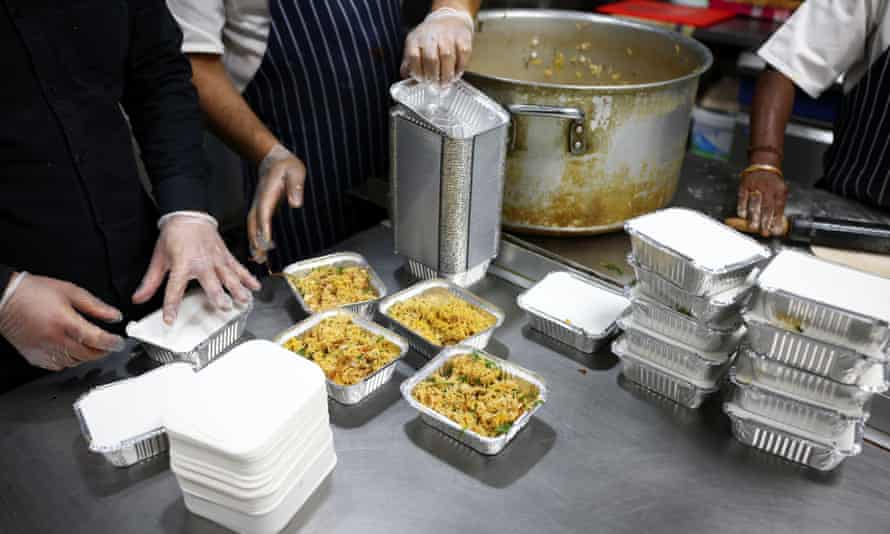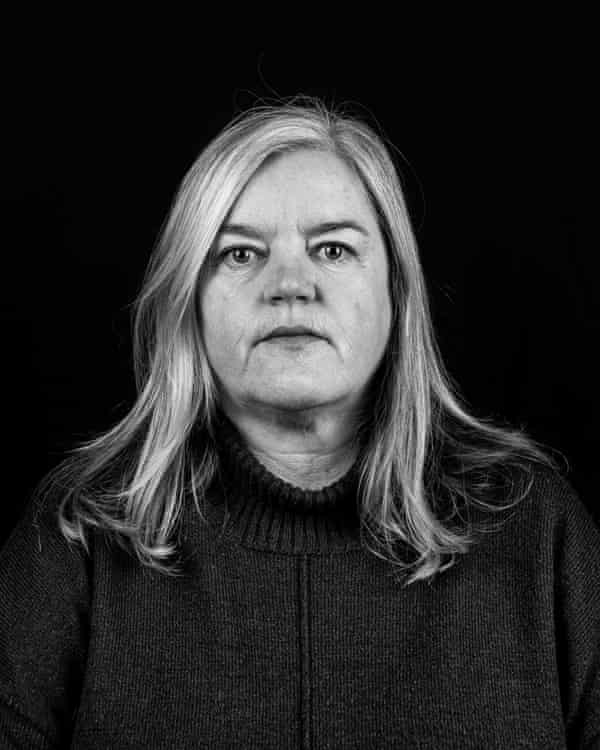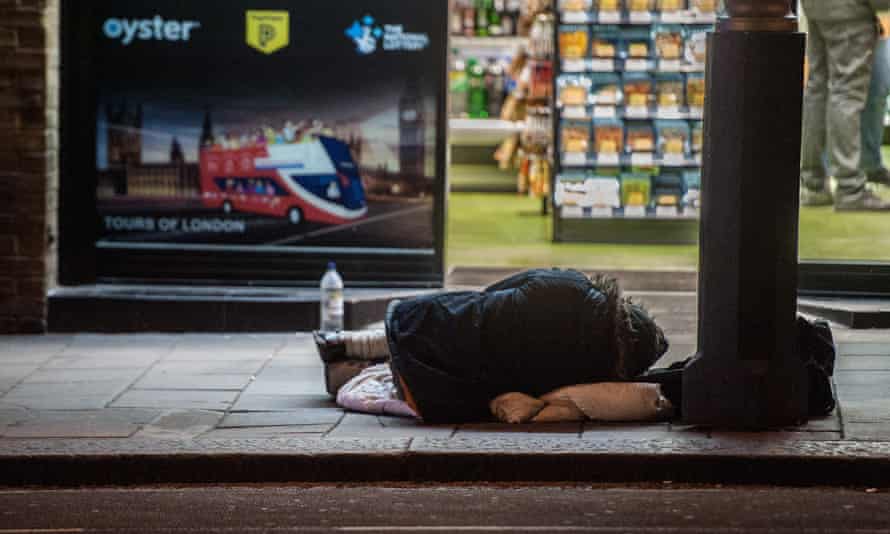Shortly earlier than the primary lockdown started final March, Louise Casey flew again to Britain from Australia, the place she’d been working as an adviser on homelessness. She doesn’t, she says, journey effectively. However when she landed, there gave the impression to be no chance of giving in to jet lag. Although she’d been away for less than 10 days, the change in London was palpable. On the airport, her taxi driver instructed her that half of his colleagues had simply been laid off; he was surviving on two fares a day. Later that afternoon, she dragged herself to the grocery store. It was, she remembers, chaotic. Outdoors, she seemed within the bins the place meals financial institution donations will be left. They have been virtually empty. When she requested a workers member about this, the lady might solely gesture on the battalions of half-crazed customers, their trolleys full to overflowing. Seemingly, its clients have been too intent on stocking their very own cabinets to fret about anybody else.
On this scenario, most of us would have gone dwelling to mattress, and all the pieces would have seemed higher within the morning. Casey, nonetheless, shouldn’t be most of us. I’m unsure after we first started referring to these overseeing specific areas of presidency coverage as “tsars”, but when there may be such a factor because the tsar of tsars, she could be it. Beneath Tony Blair, she ran the Tough Sleepers Unit and the Respect Activity Drive; underneath David Cameron, the Troubled Households Unit. Final March, she hadn’t but begun her newest job, which was to hold out a assessment of the Johnson authorities’s homelessness technique – however the prospect of doing so now appeared solely to be a lot fiddling whereas Rome burned.
After some sleep, she despatched a textual content to Robert Jenrick, the secretary of state for housing, tapping it out as she stood within the foyer of his division in Whitehall. “I’m in reception,” it learn. “Can we discuss?” She laughs. “It’s all the time a second once you get a message from me saying: I’m downstairs,” she says. “I imply… nightmare.” Then once more, as she additionally observes, whereas she remains to be (nearly) an outsider in political phrases – as disdainful of hierarchies as she is of spin – she is a minimum of their outsider. Jenrick duly noticed her, and the assessment was placed on maintain. Henceforth, she could be engaged on a “mission important” venture to make sure that self-contained lodging was discovered for each tough sleeper in England. This scheme got here to be often known as Everybody In, and the miracle of it’s that it was largely profitable. In the course of the first lockdown, round 33,000 folks got beds in B&Bs, lodges and pupil lodging.
We might now resolve as a rustic that that is it. That we are going to not have tough sleepers ever once more.Louise Casey
There’s some debate about how issues stand now. If the federal government maintains that Everybody In by no means got here to an finish, homeless charities have reported that funding has dried up, and tough sleeping is again to pre-pandemic ranges. Casey is adamant that the reality lies someplace in between – “there was an enormous enchancment,” she insists – however this stated, what issues most to her now isn’t a lot the figures themselves as the way in which during which the pandemic gave readability to the issue. “It took all of the faffing out of it,” she says, a bit amazed. “From the right-on-osphere on one aspect [the liberal left is nervous of being seen to “round up” rough sleepers] to the I-don’t-want-to-spend-money-on-the-feckless on the opposite. We simply acquired on with it. We approached it from a public well being perspective – the homeless might have been super-spreaders, particularly these in communal evening shelters – and that was liberating.”
It’s this type of readability that the federal government, she believes, wants to hold on to as discuss of what the post-pandemic world would possibly appear to be begins. “That is the second,” she says. “The factor I really feel – and that is the primary time I’ve talked about it, even amongst mates – is that we’ve to know it. Are we ever going to create a Britain that’s for everybody? And if not now, then when? We’ve proven we don’t must have tough sleepers, which signifies that we might now resolve as a rustic that that is it. That we are going to not have tough sleepers ever once more.”
A meals financial institution assist station in Glasgow. {Photograph}: Kindness Homeless Road Group Glasgow/PA
From such a place to begin, it ought to, she says, be equally attainable to resolve that nobody will probably be hungry both, and that outdated folks ought to be capable to stay up for secure care on the finish of their lives: “We will do some actually intelligent, various things. The pandemic has modified attitudes. Polling exhibits that 74% of individuals are OK with the tiny uplift [£20] in common credit score. They need it to proceed. If we requested, say, the 750,000 individuals who needed to volunteer for the NHS whether or not they might afford to offer a quid to the federal government – a voluntary contribution – wouldn’t lots of them be glad to take action?”
That is the third time I’ve met Casey. She lives close to me, and immediately has come to my workplace to speak, a sheaf of typed statistics underneath her arm. However although I’m used to her very specific power by now – beside her, I typically really feel anaemic, like a plant that has been stored too lengthy in a cabinet – I’m nonetheless stunned on the straightforwardness that follows. It’s as if she has been ready, and now, abruptly, she is prepared.
“We have to transfer into Royal Fee territory,” she says. “A brand new Beveridge Report [drafted by the economist William Beveridge in 1942, this was the document that led to the founding of the welfare state]. That’s the sort of factor I’m speaking about.” Crikey. Is that this a job she wish to tackle herself? I have a look at her steadily, questioning if she’s going to bask in a bout of it’s-not-for-me-to-say. However, no. She doesn’t a lot go in for let’s faux. “Sure, I’d like to be a part of that,” she says. “Authorities can, if it needs to, do one thing on a distinct scale now. The nation has been torn aside, and there’s no level being defensive about that. We’ve acquired to reward one another some correct area to assume. We’ve started working out how to not depart the badly wounded behind.”
I meet Casey for the primary time on a chilly, moist January morning on the Queen’s Crescent Group Centre in Kentish City, north London. Having stepped again from her work for the federal government final August (“I’d proven what may very well be executed; I simply felt like I used to be being pulled again into the system”), she has turned to creating as a lot noise as attainable within the media and elsewhere concerning the devastation she believes the pandemic will depart behind – and due to this, she makes a lot of visits to such locations: on this case, someplace that, sensing determined want, turned itself virtually in a single day right into a meals financial institution. Knowledge, she believes, is meaningless until backed by expertise – what she calls, utilizing a phrase from the long-ago days when she labored in homelessness outreach, “eyes on” – and by no means extra so than now, after we’re all indoors, oblivious to what could also be occurring outdoors.
Due to the brand new variants of Covid-19, shoppers can not enter many meals banks – therefore the street-facing counter, behind which, after I first clap eyes on her, Casey is standing, wrapped in her lengthy inexperienced coat. Each week, a minimum of 150 folks search assist right here. It really works like this. Shoppers clarify each what they want, and what they don’t. “I’ve acquired bread at dwelling,” they may say, “however I’d like some potatoes, please.” Volunteers then describe what’s in provide. “What a couple of lettuce?” they’ll ask. Or: “Would you want one in every of these curries?” Lastly, a procuring bag is crammed and handed over. It’s pleasant, form and fast.
What tends to go unstated, until somebody is in open misery, is how unhappy and determined a time that is for these in line. It’s apparent that lots of these pitching up listed below are new to meals banks, simply as they’re new to the advantages system – just like the younger lady who comes ahead because the volunteers are about to close up store, holding the arms of her two little ladies. “May I’ve some milk?” she asks, uncertainly. Casey, who’s ever-brisk, however so heat, too – an old style, soft-hearted, hyper-efficient battleaxe – reassures her that, sure, in fact she will. However isn’t there the rest she’d like as effectively?
Three weeks later, after we meet to speak correctly, I remind her of this lady. Afterwards, Casey’s eyes had crammed with tears as we went over what we’d seen. “Sure,” she says. “Nicely, it was upsetting. You have been very upset, too. I suppose it’s as a result of these are individuals who’ve all the time coped prior to now. I met a girl at one other meals financial institution in Bexley. Her pal had pushed her there, and I helped her to the automobile along with her procuring so I might discover out what was happening. She and her husband had three kids. They have been each furloughed. Cash acquired tight. He left. She’d waited two months for common credit score. I defy anybody to dwell with none cash for 2 months. The cracks within the system are rising and the obvious situation round these cracks is starvation.” Casey believes that starvation is barely set to develop in Britain, for the very stark motive, she predicts, that it’ll not be lengthy earlier than roughly 25% of the inhabitants will probably be in some type of hardship.
 Employees on the Lahore Spice restaurant put together meals to be donated to homeless folks in Tooting, south London. {Photograph}: Henry Nicholls/Reuters
Employees on the Lahore Spice restaurant put together meals to be donated to homeless folks in Tooting, south London. {Photograph}: Henry Nicholls/Reuters
“We will get there fairly rapidly,” she says. “By March, there will probably be 6 million folks on common credit score [in October, there were 5.7m]. Virtually 4 million individuals are furloughed, and people nonetheless working are on much less earnings [in a survey by the Resolution Foundation, 26% of adults reported suppressed wages during the first lockdown]. Unemployment has doubled [it stood at 1.72 million in November 2020], and can preserve rising. Two million individuals are nonetheless on legacy advantages – which implies they didn’t get the £20 uplift that got here with common credit score. Then you definitely add within the 5 million people who find themselves in debt [42% of adults report using at least one form of borrowing to cover everyday living costs].”
Pre-pandemic, there have been 280,000 homeless in England and Wales. Earlier this month, the federal government introduced that the ban on bailiff-enforced evictions, which protects non-public renters, could be prolonged to the top of March. However it’s going to finish finally. “At which level, household homelessness will rise,” says Casey. “If 25% of your inhabitants is affected, then you may’t simply tweak outdated insurance policies, figuring out the least costly, least difficult factor that may be executed. You want massive new insurance policies.”
Casey understands that many individuals will take into consideration all this, and really feel one thing near despair; we’ve, she accepts, misplaced religion in politicians to impact change. “That tradition of by no means answering a query,” she says. “It’s not that they’re dishonest. However they’re disingenuous. Typically, I can barely take heed to them myself. Folks in energy have gotten themselves into this case the place they must faux all the pieces is OK on a regular basis, as a substitute of claiming: no, it isn’t, and let’s work out what we will do. This fixed rebuttal, it’s like an arcade recreation: ping, ping, ping. I believe it began underneath Labour. It’s about motion, not options. Meals banks, free college meals: they’re all motion. However are they fixing starvation? No. It’s like me, earlier than I went to Rotherham [in 2014, she led an inspection of children’s services at Rotherham Council, following the child exploitation scandal in the town]. My GP stated to me: Louise, I may give you prescriptions for this and that, however sooner or later, it’s essential work out how you will cease needing these prescriptions. You have to drop extra pounds.”
From her, although, you choose up two feelings. Despair, sure. But in addition a willpower that might actually cross for optimism. At any time when she speaks – as she did to native authorities workers in Wales the opposite day – she all the time goes down a storm. Folks discover her inspirational, galvanising. (Although the initiatives she has overseen haven’t all the time been totally profitable: her work on troubled households for David Cameron, as an example, didn’t, maybe, make the sort of inroads it ought to have.) What motivates her?
I’m solely 55. I believe that ladies typically begin to disappear at this age, and that’s after we are in our primeLouise Casey
She has a strong and abiding sense of the precariousness of life: of the thinness of the road that separates those that are surviving from those that are thriving. “I don’t discuss my non-public life a lot,” she says. “However to sound like Nick Clegg for a second, my brother, who’s a barrister, and I are each tales of social mobility. My father acquired off a ship from Eire as an adolescent. His father had died, and all of the brothers have been dispatched to totally different locations. He got here in to Liverpool.” What did he do for a dwelling? “He put telephones into prisons. I’m unsure in 2021, that what occurred in our case, is feasible. I left faculty with a £300 overdraft, and I used to be nervous sick about that. It will by no means occurred to me to go to college if it had incurred the debt it does now.”
Casey went to a Catholic complete college close to Portsmouth, the place she grew up. “I owe these nuns,” she says, with actual feeling. (Alhough she is not a believer, at key moments, she has typically discovered herself sitting in the back of a church, making an attempt to make up her thoughts what to do.) However having failed her A-levels, she took a job on the Hayling Island Sunshine Vacation Camp, the place she labored within the cafe. She hoots with laughter. “All my Christmases got here when, sooner or later, they didn’t have a Yellow Coat who might name the bingo. I assumed I’d arrived. However they by no means requested me once more.” In these days – it was the 80s – work paid. She ran this job alongside a few others, one on a Saturday. One of many issues that worries her most about Britain in 2021, is the truth that, within the gig financial system, work typically doesn’t pay – and that that is so little acknowledged.
 Louise Casey. {Photograph}: Antonio Olmos/The Observer
Louise Casey. {Photograph}: Antonio Olmos/The Observer
She retook her A-levels, and did her diploma at Goldsmiths, in London. She needed to be both a social employee or a journalist. “I acquired a job in a advantages workplace to see if I might hack it – social work, I imply.” Working behind a Perspex display screen in Brixton – folks would typically punch it, and occasionally even take an axe to it – steadily made her really feel powerless. How little she might actually do to assist. However it additionally despatched her, finally, within the course of St Mungo’s, the homelessness charity, the place she labored subsequent, and later Shelter, the place she would rise to be deputy director. She was appointed to run the Tough Sleepers Unit by Tony Blair in 1999.
Casey acquired a DBE in 2016, for companies to households and weak folks. “I beloved being a Dame,” she says. “That was sufficient for me.” However final July, she was made a crossbench peer – a civil service appointment – and maybe this performed into her resolution to stroll away from the present authorities. “I’m a little bit of a one-woman-from-Finsbury-Park present for the time being,” she says. “I roam across the place, annoying folks.” The Lords will, she hopes, give her a base: “When Mark Sedwill [a former cabinet secretary and the head of the civil service] rang to inform me I used to be going to be nominated, he stated: ‘We wish to just be sure you are safe for all times to talk with out concern or favour.’”
She repeats the phrases extra slowly, italicising them: “With out concern or favour.” How did she really feel at that second? “I couldn’t converse. Mark stated: ‘Have I simply silenced Louise Casey? That’s a primary.’” She seems to be away, on the sting of tears. “I felt very upset, I believe. I used to be overwhelmed.” Why? “It’s not for folks like me, actually. It’s an enormous factor, and an odd factor. It has trappings that depart a style in your mouth, however on the identical time… how superb.”
Is she prepared, now, to be a tsar as soon as extra? For an enormous new job that, if I’ve learn her proper, is likely to be the most important and most important of her life? “I form of really feel like I’ve acquired one thing in me, sure. I’m solely 55. I believe that ladies typically begin to disappear at this age, and that’s after we are in our prime. I don’t assume there’s something that fazes me any extra. I’m very powerful. I’m stuffed with power. The gray matter is all there. I all the time really feel that I put myself down a bit to make different folks really feel higher, after I needs to be saying: I’ve labored for 5 prime ministers.” She smiles at me, understanding I share her frustration. “Males at this age are seen to be statesmanlike, aren’t they?” she says. “What’s the equal of that for a lady?”
A few days after our go to to the meals financial institution, Casey and I am going out with St Mungo’s, whose outreach staff, appearing on calls from the general public, or from homeless folks themselves, should attempt to discover those that are nonetheless sleeping tough with the intention to supply them lodging. We meet at 9.30pm, and the hours that comply with are so unusual and unhappy. It’s heartening that comparatively few folks appear to be on the streets for the time being; greater than as soon as, we strategy a bundle of bedding or a tent, solely to search out it empty. However the preternatural quiet on this a part of town – we’re in the course of Westminster – is unnerving. There isn’t any one round. No commuters, no late-night revellers, no taxi drivers and, above all, no police. If tough sleepers are all the time in some hazard, they will not often have been so weak as in lockdown. Something might occur, and nobody could be there to intervene. The boys we do discover are each overseas nationals – within the pandemic, so many individuals have gotten caught – and each have chosen to sleep close to church buildings. “I’m all the time struck by the truth that even now folks nonetheless consider such locations as safer,” says Casey.
 A homeless individual sleeps on a London avenue. {Photograph}: Man Smallman/Getty Photos
A homeless individual sleeps on a London avenue. {Photograph}: Man Smallman/Getty Photos
Within the automobile on the way in which dwelling, I inform her that for the primary time in 30 years of dwelling in London, I’d felt nervous as I walked from the tube to fulfill her: a stranger in my very own metropolis, with footsteps that have been too loud, and a shoulder that needed to be seemed over each different minute.
“Nicely, that is what I imply,” she says, or one thing prefer it, as we drive north on the traffic-less streets in file time. “For lots of people, all the pieces – not simply tough sleeping, I imply all of it – is happening some other place, out of sight.” Her job, she thinks, is to make folks see what at current they can’t, the higher to be ready after they do lastly step out into the world as soon as extra. Once more, she makes use of her favorite phrase. “Eyes on,” she says, as we swoop down into the Kingsway underpass.





